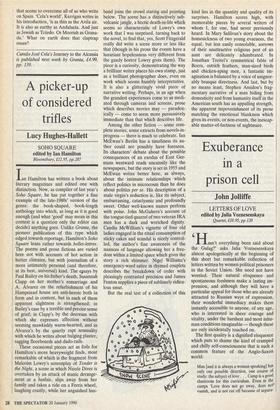A picker-up of considered trifles
Lucy Hughes-Hallett
SOHO SQUARE edited by Ian Hamilton Bloomsbury, £12.95, pp.287
I an Hamilton has written a book about literary magazines and edited one with distinction. Now, as compiler of last year's Soho Square, he has put together a fine example of the late-1980s' version of the genre: the book-shaped, book-length anthology into which, as long as it is good enough (and what 'good' may mean in this context is a question only the editor can decide) anything goes. Unlike Granta, the pioneer publication of this type which edged towards reportage, Hamilton's Soho Square leans rather towards belles-lettres. The poems and prose fictions are varied here not with accounts of hot action in hotter climates, but with journalism of a more intimately personal (and therefore, at its best, universal) kind, The essays by Paul Bailey on his father's death, Susannah Clapp on her mother's remarriage and A. Alvarez on the refurbishment of his Hampstead house are anti-heroic both in form and in content, but in each of them apparent slightness is strengthened; in Bailey's case by a terrible and precise sense of grief; in Clapp's by the decorum with which she expresses affection without seeming mawkishly warm-hearted, and in Alvarez's by the quietly rapt sensuality with which he writes about bulging plaster, sagging floorboards and dado-rails.
These occasional pieces act as foils for Hamilton's more heavyweight finds, most remarkable of which is the fragment from Malcolm Lowry's screenplay of Tender is the Night, a scene in which Nicole Diver is overtaken by an attack of manic derange- ment at a funfair, slips away from her family and takes a ride on a Ferris wheel, laughing crazily, while her anguished hus- band joins the crowd staring and pointing below. The scene has a distinctively sub- volcanic jangle, a hectic death-in-life which seems so characteristic of Lowry's own work that I was surprised, turning back to the novel, to find that, yes, Scott Fitzgerald really did write a scene more or less like that (though in his prose the events have a luxuriant hopelessness very different from the gaudy horror Lowry gives them). The piece is a curiosity, demonstrating the way a brilliant writer places his own stamp, just as a brilliant photographer does, even on work which seems humbly interpretative. It is also a glitteringly vivid piece of narrative writing. Perhaps, in an age when the grandest experiences come to us medi- ated through cameras and screens, prose which describes movies may — paradox- ically — come to seem more persuasively immediate than that which describes life.
Among the other fiction — some com- plete stories, some extracts from novels-in- progress — there is much to celebrate. Ian McEwan's Berlin has a timeliness its au- thor could not possibly have foreseen. Its characters' debate about the possible consequences of an exodus of East Ger- mans westward reads uncannily like the newspapers, but the story is set in 1955 and McEwan writes better here, as always, about the intimate relationships which reflect politics in microcosm than he does about politics per se. His description of a male virgin's seduction is, like its subject, embarrassing, cataclysmic and profoundly sweet. Other well-known names perform with poise. John McGahern's account of the tongue-tied quarrel of two veteran IRA men has a dark and wretched dignity. Candia McWilliam's vignette of four old ladies engaged in the ritual consumption of sticky cakes and scandal is nicely control- led, the author's fine awareness of the nuances of language allowing her a free- dom within a limited space which gives the story a rich shimmer. Nigel Williams's emergency-ward satire in rhymed couplets describes the breakdown of order with pleasingly contrasted precision and James Fenton supplies a piece of sublimely ridicu- lous smut.
But the real test of g collection of this kind lies in the quantity and quality of its surprises. Hamilton scores high, with memorable pieces by several writers of whom I, for one, had never previously heard. In Mary Sullivan's story about the homesickness of two young evacuees, the equal, but less easily consolable, sorrows of their unattractive religious pest of an aunt are delicately adumbrated. In Jonathan Treitel's symmetrical fable of Boers, ostrich feathers, man-sized birds and chicken-aping men, a fantastic im- agination is balanced by a voice of unignor- ably brusque directness. And last, but by no means least, Stephen Amidon's frag- mentary narrative of a man hiding from domesticity and from humanity itself in the American south has an appalling strength, the apparent impoverishment of its prose matching the emotional blankness which gives its events, or non-events, the inescap- able matter-of-factness of nightmare.


















































 Previous page
Previous page